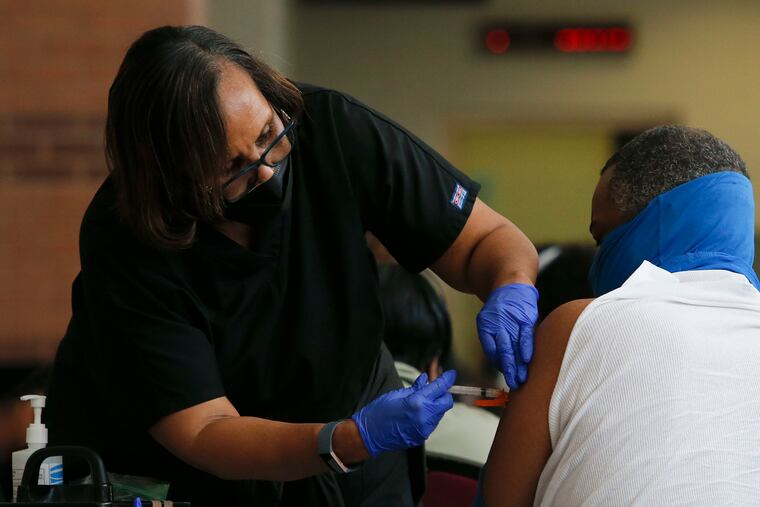Black people were blamed for COVID vaccine hesitancy when access was the problem
Instead of issuing reports on vaccine hesitancy, the CDC should focus on fixing vaccine distribution problems.

In March 2021, an Inquirer op-ed asked: “Why are Black people being treated like America’s vaccine hesitancy problem?” That op-ed is the first of 94 references in my research team’s new study in the journal Scientific Reports. We analyzed 385,930 COVID-19 vaccine doses shipped to Pennsylvania in the first phase of vaccine distribution (Dec. 14, 2020, to April 12, 2021) and found that white people had 81.4% more doses shipped to their neighborhoods than Black people did.
How did that happen, and why does it still matter?
Between December 2020 and July 2021, 92% of U.S. COVID-19 vaccines were shipped to addresses determined by large pharmacy chains — not state or local governments. Through this Federal Retail Pharmacy Program (FRPP), billions of taxpayer dollars were transferred to pharmacies. The federal government paid about $15 to $20 per dose, shipped those doses to pharmacies for free, and let pharmacies charge private insurance, Medicare, or Medicaid for every shot.
The Centers for Disease Control and Prevention issued guidance promising to “ensure that jurisdictions have full visibility” into the FRPP, but that promise was empty.
According to a Government Accountability Office (GAO) report to Congress, state and local officials received “limited or no information about where vaccine doses were going,” making “it difficult for states to … distribute their own limited supply.”
The Office of Inspector General at the U.S. Department of Health and Human Services reported that 44 of 56 government programs received inadequate data on FRPP shipments, while 14 programs received no data at all from at least one pharmacy chain.
The public was also kept in the dark.
A March 2021 Politico article praised the FRPP for administering 65% of its doses to “racial and ethnic minorities,” but a second GAO report puts the actual number at less than 40%. The first 100 Google News results reveal no other mainstream coverage of the FRPP between April 2021 and January 2023, when the Hill claimed the “strategy has worked wonders.” In a sense, it had.
Jurisdictions were left wondering how to diagnose, let alone cure, the racial disparities in FRPP vaccinations without decent data. According to a second Office of Inspector General report, “gaps in this data hindered their efforts to identify and address inequities in vaccine distribution and administration.” One state told the GAO that pharmacies sent excessive doses to “areas with a sufficient number,” but without authority to stop them, state officials could only “negotiate with pharmacy partners … to send vaccine doses to pharmacy sites in higher-need areas.”
Yet, in April, the CDC wrote that the FRPP should “serve as a model … to provide health services in other public health emergencies.”
In Philadelphia, where chart-topping segregation makes racial exclusion a breeze, white people didn’t have 81.4% more FRPP doses shipped to their neighborhoods — they had 570.1% more doses. And the FRPP short-changed Philadelphians of all races. Already facing a shortage due to a homegrown for-profit vaccine scandal, and home to more than 12% of Pennsylvania’s population, the city received just 2.18% of FRPP doses.
That’s not a “model,” it’s a bad influence.
Nationally, Black people were blamed for their own low vaccination rates even before vaccines were available. But data suggest that Black people in Pennsylvania and elsewhere wanted vaccines. In April 2021, Black Pennsylvanians were 65% less likely than white Pennsylvanians to be vaccinated. One year later, once vaccines were widely available, they were 20% more likely to be vaccinated, according to a Kaiser Family Foundation analysis. Where were those headlines?
Instead of issuing endless reports on vaccine hesitancy, the CDC should focus on fixing vaccine distribution problems. As long as Black Americans are denied equal access to medical treatment, anyone who tells them to trust the medical system and make better health-care choices has offered little more than a one-two punch of gaslighting and victim-blaming.
Rather than fixating on racial differences in vaccine hesitancy, we should celebrate the persistence of underserved communities that beat the odds, overcame justifiable fears, and managed to get vaccinated.
Geoff Holtzman is a Philadelphia-based researcher, data scientist, and writer whose published work spans philosophy, psychology, bioethics, and public health.